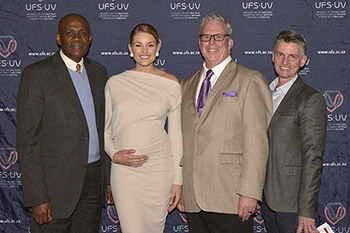
The message, From a dream to a reality, echoed
throughout the launch of the Mother and
Child Academic Hospital. From left to right:
Dr Khotso Mokhele, Chancellor of the UFS,
Rolene Strauss, Miss World 2014 and
Patron of the Mother and Child Academic Hospital,
Prof André Venter, Head of the Department of
Paediatrics and Child Health, and Dr Riaan Els,
CEO of the Fuchs Foundation South Africa.
Photo: Charl Devenish
“Sometimes dreams do come true, and finally, this institution is starting to dream big dreams.” These were the words of Dr Khotso Mokhele, Chancellor of the University of the Free State (UFS) at the launch of the Free State Mother and Child Academic Hospital collaborative initiative. The launch was an official declaration of intentions regarding the establishing of the hospital, a specialist unit which will focus on paediatric and maternal healthcare, fully supported by the Department of Health in the Free State. As the first Mother and Child Hospital in South Africa, it will be unique.
Under the leadership of Prof André Venter, the UFS Department of Paediatrics and Child Health serves over 250 000 children of the southern regions of the Free State at secondary care level, and is responsible for the tertiary care of nearly one million children from the whole of the Free State and Northern Cape Provinces, as well as some children from Northwest and Eastern Cape Provinces and Lesotho.
As part of a multi-faceted initiative, the 350-bed mother and child hospital will benefit the community of the Free State greatly, and will support the objectives of the Strategic Development Goals. It will further Free State Strategic Transformation Plan (STP) by improving access to healthcare for the most vulnerable members of the population, thus reducing paediatric mortality and improving maternal health. An additional objective of the project is to develop academic excellence, and improve the environment in which medical specialists and subspecialists develop their skills according to international standards.
Prof Jonathan Jansen, Vice-chancellor and Rector of the UFS, described the project as one which captures the head and the heart, as it caters most for little lives, a hub wherein great talent and potential waits to be unleashed. In support of the project, the university has offered a piece of land on the campus where the hospital will be built, thus strengthening the quality of tertiary education.
Former Miss World, Mrs Rolene Strauss, also pledged her support. She said she is honoured to be the patron of the project, one she believes will lead to healthier women, healthier children, and a healthier nation.
In celebration of the 50th anniversary of the Fuchs Foundation, CEO Dr Riaan Els, awarded a donation of R2250000 towards the building of the hospital, a contribution which will bring the project a step closer to its realisation.
Prof André Venter, leader of the project, hopes that it will serve as a blueprint for other academic hospitals in the country, and mark the beginning of an era of highly specialised medical care for humanity’s most precious people.